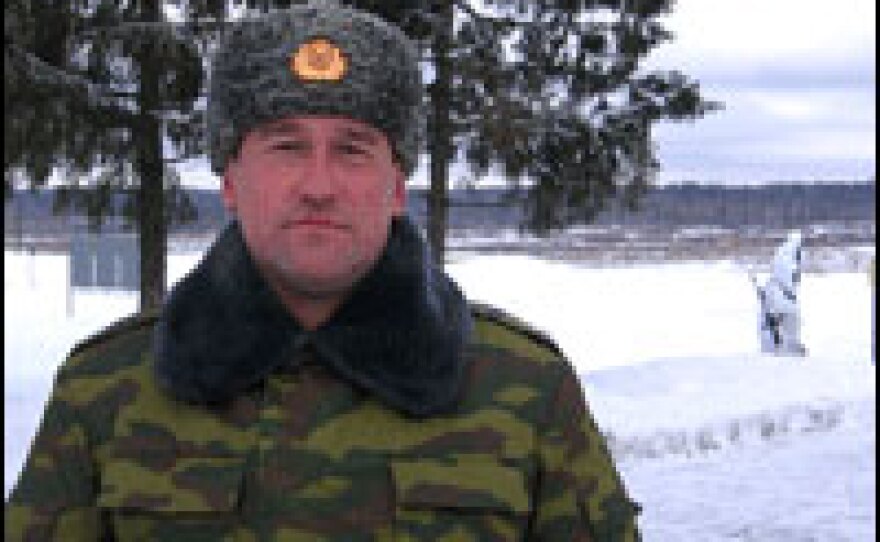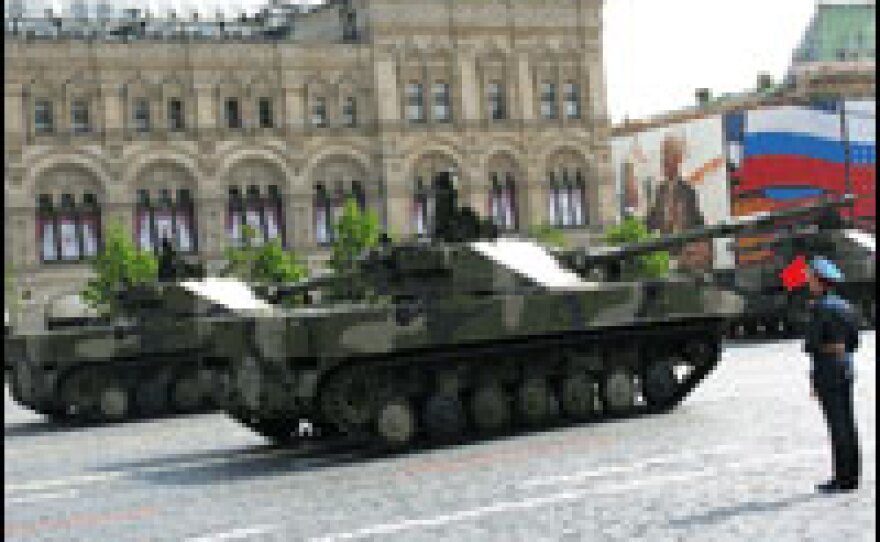


Russia's new President Dmitri Medvedev recently sacked his military chief of staff. The move has been seen as an attempt to impose reform on the once-feared Russian military. Moscow says its army is rebounding, but experts say the reality is far different.
Projecting Power
On a field outside Moscow, soldiers fire heavy machine guns and rocket-propelled grenades during target practice as officers shout commands. These are the men of the Tamanskaya Motorized Rifle Division, a famed unit formed during World War II.
Regiment commander Vladimir Kuznetsov says that under former President Vladimir Putin, the military reversed its post-Soviet decline.
"We've been re-equipped with new technology," Kuznetsov says. "And housing and social support can't be compared to what they were eight years ago."
Putin boosted military spending to $40 billion a year and put the force on display.
Last month, tanks rolled across Red Square during a parade for the first time since the end of Communism, and ancient Soviet-era bombers once again skirt the borders of NATO countries.
Russia still has the draft, but the military says the centerpiece of its reform program is a growing body of professional troops.
Weaknesses Within
Back at the Tamanskaya division's base, contract soldiers practice loading their weapons. However, a close look at these highly touted professional soldiers reveals a very different picture of Russia's military than the one the authorities portray. Many men look unwashed and exhausted. At least two have black eyes, but they all say things are fine.
Alexander Viktorov, a contract soldier who served in a unit in southern Russia, says he experienced both corruption and intimidation. He says his commanding officer extorted money from new recruits and used veteran soldiers to enforce his demands. Viktorov says they broke ribs, noses and jaws — and threatened their victims with worse if they complained.
"They beat you with their fists, and when you fall they kick you. It goes on until you give in," Viktorov says. "It's not the military. It's a mafia."
Hazing is deep-rooted in the Russian military, which critics say has treated its men like cannon fodder for centuries. Officials say that last year 450 soldiers died from beatings or suicide. The real number is probably far higher.
Viktorov says the new contract system is making things even worse, as stealing wages has provided more reason for bullying. He says he refused to hand over his money, braving beatings until he could no longer stand them.
"I decided to leave my base while I was still alive," Viktorov says. "After one beating, I washed off the blood, smoked a cigarette, and then I slipped away."
Viktorov has filed a suit to be discharged from the army.
Undermining Reform
The Kremlin is taking action. Putin appointed a former tax investigator to the post of defense minister to try to trace the billions of dollars that go missing. However, military analyst Pavel Felgenhauer says efforts to overhaul the military have so far been stymied by a hugely corrupt bureaucracy.
"The end result is no new weapons and still very low salaries for the soldiers and officers," Felgenhauer says. "Which means they're uncompetitive and the best men leave. This system is unworkable, and this military is not very good for anything at all."
Felgenhauer says the Russian military is not ready for any kind of offensive action, apart from a nuclear attack. He says despite the extra money the military received under Putin, it has managed to buy only several new fighter jets and cannot deploy its latest nuclear submarine because its highly touted new ballistic missiles do not work.
Felgenhauer says Moscow needs to change its military doctrine and stop pretending it is a global counterweight to the West. Only then, he says, can Russia start building a new military instead of trying to revive the old Soviet one.
Copyright 2022 NPR. To see more, visit https://www.npr.org. 9(MDAzMjM2NDYzMDEyMzc1Njk5NjAxNzY3OQ001))







